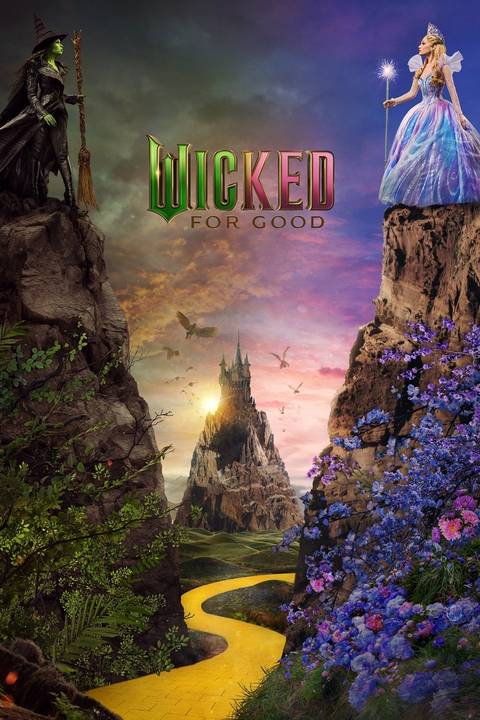Wicked: For Good may reshape how audiences look at one of the greatest movies of all time, but I encourage you to move past this. The story of Wicked builds off of L. Frank Baum’s children’s fantasy books and the beloved 1939 classic film, The Wizard of Oz. Victor Fleming’s musical is one of the most iconic and influential movies ever made, and is often considered among the defining examples of cinematic magic, utilizing Technicolor to bring the vibrant world of Oz to life in a way that was unprecedented in 1939.
The Wicked film series and Broadway play are both adapted from Wicked: The Life and Times of the Wicked Witch of the West, a dark fantasy novel written by Gregory Maguire. This book is known for its revisionist angle, seeking to shift the world of L. Frank Baum’s Oz, painting the villainous Wicked Witch as a young woman ostracized from society. Wicked explores the notion of nature versus nurture, suggesting the Witch was actually the victim of much bigger problems in Oz. With that in mind, one has to consider what it means for the rest of the Oz characters.
Warning: This will include SPOILERS for Wicked 2, but if you’ve seen The Wizard of Oz, it won’t be anything new!
‘Wicked: For Good’ Shouldn’t Change How You View ‘The Wizard of Oz’
So, if the Wicked Witch of the West is no longer the villain, the entire story of The Wizard of Oz shifts. The Wizard is the antagonist in this scenario, manipulating Oz and pinning the blame on Elphaba. This works, as the Wizard has always been a curious figure, utilizing deceit to maintain his position of power. While the 1939 film doesn’t illustrate him as an evil man, he’s certainly not who he claims to be. The same can be said for Glinda, who’s portrayed as a complex character in Wicked. She loves Elphaba, but they have a fundamental disagreement on how to protect Oz.
The major shift is with Dorothy and her companions. In The Wizard of Oz, they’re a merry band of heroes who must overcome their personal flaws and defeat the Wicked Witch. With the framing of Wicked, Dorothy is no longer a hero; she’s a pawn who gets used by Glinda and the Wizard to kill Elphaba. Now, I don’t think fans are going to walk away from Wicked: For Good, hating Dorothy and thinking she’s a villain, but even reframing The Wizard of Oz to make her nothing more than a tool who kills Elphaba is a major deviation from the original tale.
The Wizard of Oz is a beautiful story, and Judy Garland’s version of Dorothy is meant to be a hero. Wicked and The Wizard of Oz may both be excellent films set in the same world, but they need to be considered as different stories. Wicked isn’t a prequel to the 1939 movie; it’s a reimagining. It’s not recontextualizing the story; it rebuilds everything from scratch and asks a “What if…?” question.
Perhaps I’m overreacting by thinking this matters, but I believe The Wizard of Oz is one of the most integral cultural cornerstones provided by cinema. Dorothy is a hero in her story, as are the Tin Man, Scarecrow, and Cowardly Lion. They deserve to be thought of that way because in a world where movie studios constantly build on existing IP and try to franchise every title, stories need to be recognized for their individual value and meaning. Let Wicked: For Good be its own thing, and let The Wizard of Oz be the classic it’s always been.
- Release Date
-
November 21, 2025
- Runtime
-
137 Minutes


